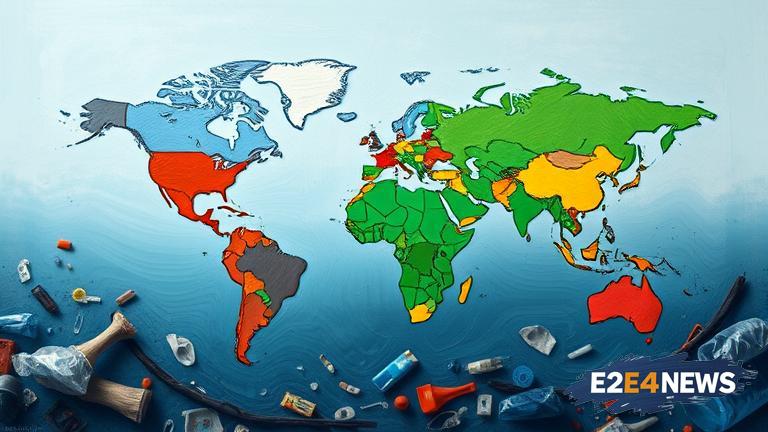The global plastic pollution crisis has become a pressing concern, with millions of tons of plastic waste ending up in oceans and landfills every year. The United Nations has been working to address the issue, but countries are at odds over national plans to reduce plastic waste. Article 14 of the global plastic treaty, which aims to reduce plastic pollution, is particularly contentious among countries. Some countries, such as the United States, are pushing for a more voluntary approach, while others, such as the European Union, are advocating for stricter regulations. The treaty aims to reduce plastic pollution by 80% by 2030, but countries are struggling to agree on how to achieve this goal. The global plastic pollution crisis is not only an environmental issue, but also a human health concern, as plastic waste has been found to contaminate food and water supplies. The World Health Organization has warned that plastic pollution is a major public health risk, and that urgent action is needed to address the issue. Despite the challenges, there are many examples of successful plastic reduction initiatives around the world. For example, Rwanda has implemented a ban on single-use plastics, and has seen a significant reduction in plastic waste. Similarly, Costa Rica has implemented a circular economy approach, which aims to reduce waste and promote sustainable consumption. However, these initiatives are not without their challenges, and many countries are struggling to implement effective plastic reduction strategies. The global plastic pollution crisis requires a coordinated and sustained effort from governments, businesses, and individuals around the world. It is estimated that over 8 million tons of plastic waste enter the world’s oceans every year, causing harm to marine life and contaminating the food chain. The impact of plastic pollution is not limited to the environment, but also has significant economic and social implications. For example, plastic pollution is estimated to cost the global economy over $2.2 billion every year. Furthermore, plastic pollution is also a major social justice issue, as it disproportionately affects vulnerable communities and exacerbates existing health and economic inequalities. The global plastic pollution crisis is a complex and multifaceted issue, and addressing it will require a comprehensive and coordinated approach. This includes implementing effective waste management systems, promoting sustainable consumption patterns, and supporting research and development of new technologies and materials. Additionally, it is essential to address the root causes of plastic pollution, including overproduction and overconsumption of plastic products. The role of governments, businesses, and individuals in addressing the global plastic pollution crisis is crucial. Governments must implement and enforce effective policies and regulations to reduce plastic waste, while businesses must adopt sustainable practices and reduce their plastic footprint. Individuals must also make conscious choices to reduce their plastic use and support organizations working to address the issue. The global plastic pollution crisis is a pressing concern that requires immediate attention and action. It is essential that countries work together to address the issue and implement effective national plans to reduce plastic waste. The future of our planet depends on it, and it is our responsibility to take action to protect the environment and ensure a sustainable future for generations to come. The global plastic pollution crisis is a wake-up call for all of us, and it is time to take action to address this critical issue. We must work together to reduce plastic waste, promote sustainable consumption, and protect the environment. The time to act is now, and we must do everything in our power to address the global plastic pollution crisis.





